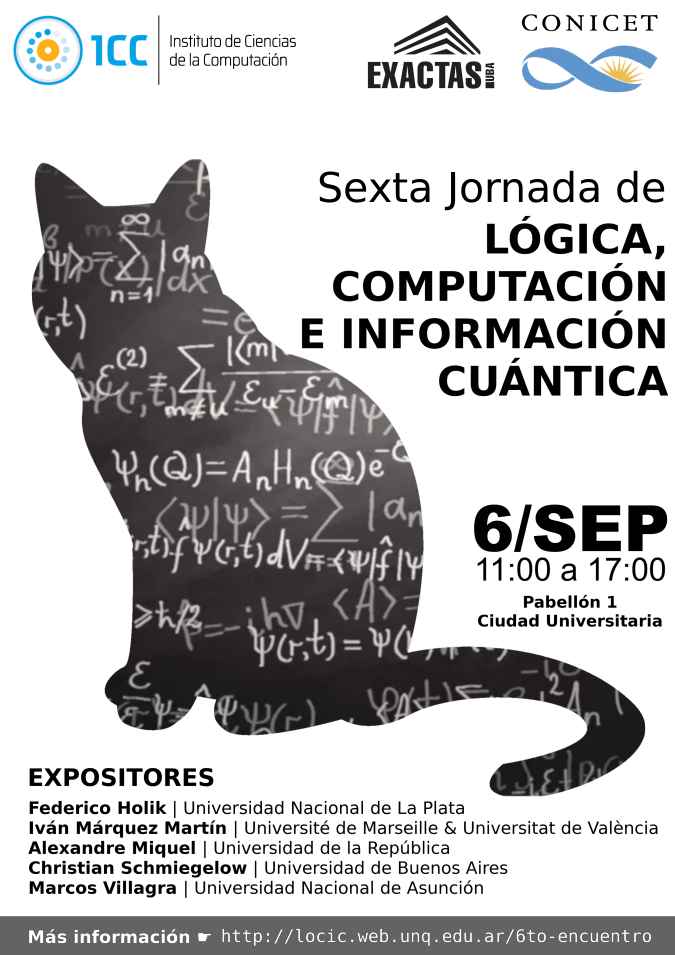6ta Jornada de Lógica, Computación e Información Cuántica.
6 de septiembre de 2018
Pabellón 2 – Ciudad Universitaria – CABA
La 6ta jornada de lógica, computación e información cuántica se realizará en el Instituto de Ciencias de la Computación (CONICET–Universidad de Buenos Aires) el jueves 6 de septiembre de 2018.
Ésta es la 6ta jornada organizada por el grupo LoCIC: Lógica, Computación e Información Cuántica, conformado en 2017 entre investigadores de diversas universidades de la región del Río de la Plata. Las jornadas anteriores se desarrollaron en CAECE (junio 2018), UNQ (marzo 2018), UNLP (octubre 2017), UNAJ (julio 2017), y UNQ (marzo 2017). Invitamos a participar a investigadores y alumnos de todas las universidades.
:: Programa
Debido a la decisión unilateral del Ex Ministerio de Ciencia, Tecnología e Innovación Productiva de Argentina de no respetar ninguno de los acuerdos bilaterales vigentes, Iván Márquez Martín, miembro del Proyecto bilateral entre Francia y Argentina ECOS-Sud A17C03 «Quantum Calculi», ha debido cancelar su visita al país.
Más información aquí: http://nexciencia.exactas.uba.ar/mas-senales-de-ajuste-en-investigacion

:: Organizadores locales
- Guido Bellomo
- Ariel Bendersky
- Alejandro Díaz-Caro
- Santiago Figueira
:: Resúmenes
- Christian Schmiegelow (Instituto de Física de Buenos Aires. Universidad de Buenos Aires – CONICET, Argentina)
Presente y perspectivas del Laboratorio de Iones y Átomos Fríos de la UBA. - Federico Holik (Instituto de Física de La Plata. Universidad Nacional de La Plata – CONICET, Argentina)
Medidas entrópicas y MaxEnt en modelos probabilísticos generalizados.
Discutimos medidas entrópicas y el principio de Máxima Entropía de E.T. Jaynes (MaxEnt) en teorías probabilísticas generalizadas [1,2,3]. En particular, estudiamos la posibilidad de incluir la acción de grupos en las condiciones del problema de MaxEnt, de forma tal de expandir su dominio de aplicabilidad [3,4].
[1] F. Holik y A Plastino, «Quantal effects and MaxEnt», Journal of Mathematical Physics, 53 (2012).
[2] F. Holik, G. M. Bosyk y Guido Bellomo, «Quantum Information as a Non-Kolmogorovian Generalization of Shannon’s Theory», Entropy, 2015, 17, 7349-7373; doi:10.3390/e17117349.
[3] M. Portesi, F. Holik, P.W. Lamberti, G. Bosyk, G. Bellomo y S. Zozor, «Generalized entropies in quantum and classical statistical theories», The European Physical Journal Special Topics, en prensa (2018); arXiv:1802.08673v1.
[4] F. Holik, C. Massri y A. Plastino, «Geometric probability theory and Jaynes’s methodology», International Journal of Geometric Methods in Modern Physics, Vol. 13 (2016) 1650025.
[5] M. Losada, F. Holik, C. Massri y A. Plastino, «Solutions for the MaxEnt problem with symmetry constraints», arXiv:1807.11168v1, (2018). - Alexandre Miquel (Universidad de la República, Uruguay)
Programming unitary operators in a linear-algebraic typed lambda-calculus.
In this talk we present a semantics for a linear algebraic lambda-calculus based on realizability. This semantics characterizes a notion of unitarity in the system, answering a long standing issue. We derive from the semantics a set of typing rules for a simply-typed linear algebraic lambda-calculus, and show how it extends both to classical and quantum lambda-calculi. - Marcos Villagra (Universidad Nacional de Asunción, Paraguay)
Quantum Algorithms for Multiobjective Optimization.
In this talk we will present two approaches to tackle multiobjective optimization problems using quantum algorithms. A multiobjective optimization problem is an optimization problem with two or more objective functions that need to be optimized at the same time. Usually, these objective functions present trade-offs and there is no single optimal solution, but a set of so-called Pareto-optimal solutions. In a first approach we will show how to turn previous algorithms for single-objective optimization into multiobjective algorithms using Grover’s search method. Based on experimental results, we show how a simple quantum adaptive search strategy suffices to find approximate solutions as good as the state-of-art classical multiobjective algorithm NSGAII, with evidence of a quadratic speed-up. In our second approach, we solve a multiobjective problem using the Quantum Adiabatic Algorithm of Farhi et al. (arxiv:quantph/0001106). Here, in contrast to our quantum adaptive search method, we are able to prove finite-time convergence of the algorithm to a single Pareto-optimal solution, provided certain natural conditions on the underlying multiobjective problem hold. This last result is completely documented in arXiv:1605.0315. - Iván Márquez Martín (Université de Marseille, Francia & Universitat de València, España)
Quantum simulations via quantum walks over the honeycomb and triangular lattices.
In this seminar we will talk about how to simulate quantum physical models via discrete-time quantum walks (DTQWs) over hexagonal and triangular lattices. The study of QWs is growing due to two reasons. First, different kind of Quantum Computing algorithms have been created using them in an efficient way. On the other hand, they can be used for the purpose of quantum simulating in the future quantum simulation devices. From the quantum simulation perspective, QWs have been extensively used for reproducing relativistic particles dynamics described by the Dirac equation, always using regular lattices. We will show that QWs does not need to rely on the regular lattice grid, and that they can be casted on the hexagonal and triangular grid instead. We believe that this constitutes an important step towards: modeling propagation in crystalline materials; identifying substrates for QW implementations; studying topological phases and understanding propagation in discretized curved spacetime.

